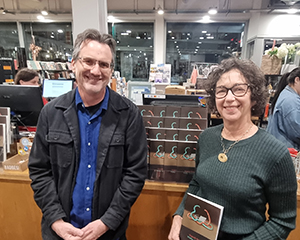
Philip Armstrong & Sue Wootton
On Thursday 3 July 2025, we came together to celebrate the launch of Philip Armstrong’s new poetry collection, Touch Screen.
We had fantastic company, amazing kai from Portershed Cafe and the incredible Scorpio Books as our hosts. A massive thank you to Scorpio Books, Claudia Herz Jardine and everyone who came to help us celebrate! Thank you also to Anna Smith and Siobhan Collins for launching Philip’s book for us.
Here’s some of Siobhan Collins launch speech:
The elegant cover with its play on the Garden of Eden in the image of entwined snakes and a gesture to the Fall through the apple motif on the computer nested between them beautifully introduces the reader to the way in which this poet treats his subject matter.
As a member of a small writing group, I have had the privilege of being present at the birthing of a number of poems in Touch Screen.
Phil’s capacity to be playful with serious subjects is well demonstrated in his new volume of poetry – a balance that is hard to execute but brilliantly achieved.

Launch of Touch Screen at Scorpio Books, Christchurch
Phil is a highly intelligent poet – erudite yet accessible, exercising his readers as all good poets should. Often the reader feels he is talking intimately just to them as he mines his observations about nature, technology and the business of living a life in relation to these.
His ethical eye shines through this collection. Phil is preoccupied with nature and its degradation as well as the encroachment of technology, and these themes weave through much of the poems in this new work.
‘The Sacred Wood’ shares its title with T.S. Eliot’s collection of critical essays and perhaps also is a nod to W.B. Yeats’ ‘Song of the Wandering Aengus.’
Throughout the book, we meet language that is rich and redolent – it rolls off the tongue.
For example:
make yourself an alabaster jar
your carved skin filled with honey liquor
white water marriage
wet as water rats
‘Anastomosis’ demonstrates Phil’s ability to mine humour from dark places as the poem turns in on itself with the juxtaposition of light and dark; boyhood hooning and connection with disconnection and loss in adulthood.
Here is the voice of a mature poet. This is a collection to ponder, revisit and savour.
And here’s some words from Anna Smith:
Ngā mihi nui ki a koutou katoa.
If I wanted to find an expression that illuminates the writing in Touch Screen, it might be the eccentric but scientifically precise one of extremophile. An extremophile is a micro-organism able to survive in extreme conditions, and to which Philip referred in one of his early poems we read as a writing group. Poets who survive the extreme challenges of their environments, scouring language for unexpected relationships between words, sounds and thought, do so because they have persistence – an ability to evolve despite, or even because of, hostile conditions.
Take for example the poem, ‘Black Druid’.
All at once we’ve got a ‘feathered darkness,’ a ‘yellow eye’ and a ‘you’ lying in bed before dawn. A bird begins to sing. As the words unspool, the ‘you’ quietly listening transitions to the other, that lovely recognition of the Irish ‘himself,’ and the identity of the singing black bard takes over from the human who merely listens with a ‘mongrel’ at his back. Barbicels are interlocking hooks on feathers that create a natural aerodynamic lift. Here, the yellow ‘needle’ gathers them up into a ‘thread’ that produces a blackbird’s song.
There’s definitely a running stitch being referenced, except it’s an anarchic one. From joining strips of skin to the art of quilt-making, running stitch is one of the simplest fastening techniques humans ever learnt. What ‘black druid’ does with this is instructive, however, because the lines don’t go where we as readers expect them to. There is a gesture to sewing as craft but the actual practise of threading and pleating, and their way of drawing in the exhalations of trees, the sounds of trucks changing gears, the doggy breaths and the low roar of the ocean, produce a texture that ravels and unravels as it goes. Its druidic magic can’t be repeated or fully parsed; only listened to.
So what are we to make of the trickiness of the poem above? One thing it acknowledges is its intention to remove human consciousness from the centre of experience. Much of the collection of Touch Screen encounters and celebrates a world of natural phenomena, of bodies – where a human observer is crammed into the margins. ‘Nobody thinks about the body better,’ goes a line in ‘Mollusc Song’ and that body is not usually human.
If this collection isn’t crafted by a consummate poet, then I don’t know what else in current New Zealand poetry qualifies. Having followed Philip Armstrong’s writing for a number of years, on occasions I’ve actively resisted absorbing a vision of renaissance ‘man’ banished from the page. Nonetheless, it makes a beautiful, passionate, and cosmic sense and I hope that you can join with me in celebrating this launch of Touch Screen.
Kia ora, kotu katoa.
Find out more about Touch Screen here.
